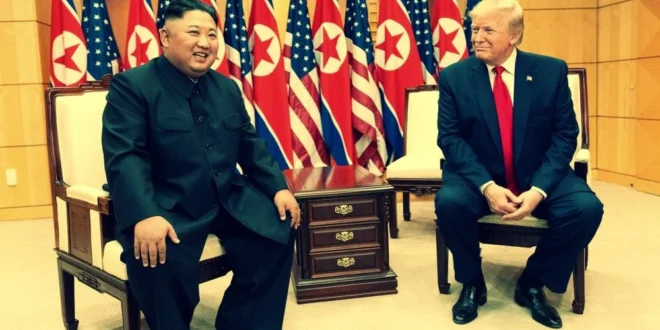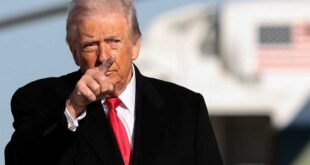North Korea policy in the first Trump administration allowed the U.S. to test the proposition that maximum sanctions pressure on the North Korean economy, combined with the allure of summit-level diplomacy with the U.S., would sufficiently alter Kim Jong Un’s calculus about giving up his nuclear deterrent.
That proposition, unfortunately, turned out to be false.
This was not only clear at the Hanoi summit when Kim refused to go beyond previous offers to freeze portions of his nuclear program but was crystalized after the DPRK sealed off its own borders and stopped all trade and people flows after COVID-19 emerged in early 2020.
This resulted in a three-year self-imposed economic stranglehold that was more devastating to the North Korean economy than any maximum sanctions pressure could ever be.
Despite this unsuccessful test of intentions, however, it is likely that in a second term, President Trump would again seek to “close a deal” with Kim via in-person summitry.
In Hanoi, President Trump perceived that Kim Jong Un was “not ready” to close the deal and, in such circumstances, believed there was no need to rush to a “bad deal.” In the event of another Trump presidency, North Korea would likely be willing to engage with the U.S. to see what might be on offer and to make China and Russia uncomfortable. However, it is even less likely that Kim Jong Un would be serious about a deal with the U.S.
One aspect of a second Trump presidency that would increase the unlikelihood of successful North Korea diplomacy is increasingly antagonistic U.S. relations with China. Under Trump’s first term, the U.S. managed to get China to cooperate on implementing sanctions on North Korea.
A second Trump presidency will likely see heightened antipathy towards Beijing, making the prospect of bringing North Korea around extremely remote. Kim Jong Un may not like being overly dependent on Beijing’s largesse, but he also knows he cannot afford to alienate China.

If the U.S. and China are not working together, there is almost no chance of progress on the North Korea issue; the most likely outcome is further advancement of North Korea’s weapons programs (possibly with Russia’s help) and heightened tensions or crisis.
About the Authors
Susan A. Thornton is a retired senior U.S. diplomat with almost three decades of experience with the U.S. State Department in Eurasia and East Asia. She is currently a Senior Fellow at the Yale Law School Paul Tsai China Center. She is also the director of the Forum on Asia-Pacific Security at the National Committee on American Foreign Policy and a nonresident senior fellow at the Brookings Institution. Until July 2018, Thornton was Acting Assistant Secretary for East Asian and Pacific Affairs at the Department of State and led East Asia policymaking amid crises with North Korea, escalating trade tensions with China, and a fast-changing international environment. In previous State Department roles, she worked on U.S. policy toward China, Korea, and the former Soviet Union and served in leadership positions at U.S. embassies in Central Asia, Russia, the Caucasus, and China.
Juliet Lee is the Deputy Director of the Forum on Asia-Pacific Security (FAPS) at the National Committee on American Foreign Policy (NCAFP), where she manages the organization’s Track I 1/2 and Track II conferences and meetings on security issues in the Asia Pacific, namely US-China relations, cross-Taiwan Strait relations, North Korea, and alliance management. She is also a Pacific Forum Young Leader, Korea Society Kim Koo Foundation Fellow (2018 cohort), and a member of the National Committee on U.S.-China Relations. Juliet earned her M.A. in International Relations from New York University, where she completed her Master’s thesis on how cross-Taiwan Strait security is impacted by economic interdependence between the Mainland and Taiwan, as well as by Taiwan’s domestic politics. She also earned her B.A. in International Studies with minors in French and Chinese from the University of Richmond, and she speaks Mandarin.
 Geostrategic Media Political Commentary, Analysis, Security, Defense
Geostrategic Media Political Commentary, Analysis, Security, Defense





